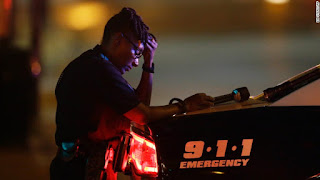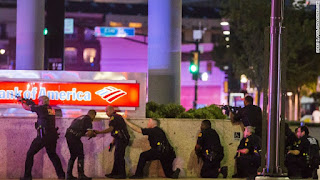America at war with itself
Now Dallas: a shameful attack on the rule of law itself, with five officers dead and seven wounded in the course of duty during what had been a peaceful protest against police violence in America.
And so many difficult but important questions arise. What have we become? Are we a people at war with ourselves, unable or unwilling to control our most violent urges? Must we settle every dispute with a gun or a bomb? Who is responsible for this mayhem that plays out on many fronts?
The outrage in Dallas comes in the immediate wake of killings of black men in Louisiana and Minnesota by police officers: I shook as I watched those videos, filled as much with wonder as rage. Like many, I will never forget the eerily calm voice of Diamond Reynolds as she spoke to the officer over the bleeding body of her boyfriend: "You shot four bullets into him, sir." She used that word "sir" again and again: a mind-bending combination of subservience and defiance.
What's going on here? Has our mad gun culture mixed in fatal ways with deeply ingrained American racism? Are we destined to play out the Civil War in every generation? Have we really blown our chance of living in a calm, integrated, respectful society where every voice has value?
It's especially painful when police are killed in the course of duty. They go about their hard work with seriousness, in good faith, but can seem at a loss to deal with the violence that is everyday fare in a country where there are many more guns than people, and with few rules in place about their use.
And the cops get no help from Congress, which refuses even to consider the possibility of regulating weapons, even in the face of repeated bloodbaths on American streets.
So now we have it, that dreadful thing: Americans are indeed at war with each other on many fronts. Not surprisingly, this conflict inhabits our political rhetoric, which has become increasingly debased, even childish.
We quickly blame the other guy: the Mexican or Wall Streeter, the immigrant, Muslims, "millionaires and billionaires." In our confusion and malaise, we have become a deeply angry nation. As such, we reach for scapegoats, and they're easy to find. Anyone who doesn't look or sound like ourselves becomes suspicious.
All we know is that we're hurting, and we desperately want two things: someone to blame, and someone to lead us to the Promised Land.
We've indeed reached what amounts to a spiritual crisis in America, and I use that term in the broadest sense. We can't love our neighbors because we can't see or really hear them. We "other" them easily, and divide ourselves in dozens of ways: Republicans and Democrats, blacks, browns and whites, North and South.
We have a dizzying array of sects, with churches on every street corner, but these churches often feel no connection to people in other churches or those -- perhaps the majority -- with no religious affiliation at all. The splintering goes on and on.
It's time to tone down the rhetoric of hatred and pull together as Americans. There is simply no place for the exaggerated language of division that has become the common currency of our daily discourse, and we must turn our backs on those who continue to talk like that.
Every one of us must try to envision the other, and to embrace him or her. And of course we must -- must -- somehow come together around sensible gun control.
It's also important to recall that we're a country with deep roots in the Enlightenment, a movement that put a high value on rational, calm, fact-based thought. Our Founding Fathers were able to come together from a broad range of backgrounds in Philadelphia in 1787, doing so with genuine respect for each other to create a union, however imperfect.
This union required a kind of faith in the goodness of other people, a belief in their fundamental honesty and human value.
We need -- black and white, Republican and Democrat, gay and straight, Christian, Mormon, Muslim, Jew or none of the above -- to take our civic responsibilities seriously. This means accepting our task as free citizens, which is to work with generosity, optimism and self-discipline for the common good, not scapegoating other people.
We must not let politicians or pundits of any kind play to our most primitive instincts, as when Joe Walsh -- a former congressman! -- quickly responded to the Dallas killings by declaring "war" on President Barack Obama and Black Lives Matter. "Real America is coming after you," he tweeted, then later deleted.
This is not a civil response to a genuine crisis, and we should not condone this kind of speech from people in positions of any kind of authority.
The truth is that no great leader is going to save us. This person does not exist, although we can certainly demand self-discipline and optimism in those we choose to represent us and can look to them for useful proposals.
Citizenship comes with severe responsibilities, especially within a democratic system, and we must not let a few bad cops and a crazed sniper define us. It's time we took these responsibilities seriously.
- Jay Parini, a poet and novelist, teaches at Middlebury College.
And so many difficult but important questions arise. What have we become? Are we a people at war with ourselves, unable or unwilling to control our most violent urges? Must we settle every dispute with a gun or a bomb? Who is responsible for this mayhem that plays out on many fronts?
The outrage in Dallas comes in the immediate wake of killings of black men in Louisiana and Minnesota by police officers: I shook as I watched those videos, filled as much with wonder as rage. Like many, I will never forget the eerily calm voice of Diamond Reynolds as she spoke to the officer over the bleeding body of her boyfriend: "You shot four bullets into him, sir." She used that word "sir" again and again: a mind-bending combination of subservience and defiance.
What's going on here? Has our mad gun culture mixed in fatal ways with deeply ingrained American racism? Are we destined to play out the Civil War in every generation? Have we really blown our chance of living in a calm, integrated, respectful society where every voice has value?
It's especially painful when police are killed in the course of duty. They go about their hard work with seriousness, in good faith, but can seem at a loss to deal with the violence that is everyday fare in a country where there are many more guns than people, and with few rules in place about their use.
And the cops get no help from Congress, which refuses even to consider the possibility of regulating weapons, even in the face of repeated bloodbaths on American streets.
So now we have it, that dreadful thing: Americans are indeed at war with each other on many fronts. Not surprisingly, this conflict inhabits our political rhetoric, which has become increasingly debased, even childish.
We quickly blame the other guy: the Mexican or Wall Streeter, the immigrant, Muslims, "millionaires and billionaires." In our confusion and malaise, we have become a deeply angry nation. As such, we reach for scapegoats, and they're easy to find. Anyone who doesn't look or sound like ourselves becomes suspicious.
All we know is that we're hurting, and we desperately want two things: someone to blame, and someone to lead us to the Promised Land.
We've indeed reached what amounts to a spiritual crisis in America, and I use that term in the broadest sense. We can't love our neighbors because we can't see or really hear them. We "other" them easily, and divide ourselves in dozens of ways: Republicans and Democrats, blacks, browns and whites, North and South.
We have a dizzying array of sects, with churches on every street corner, but these churches often feel no connection to people in other churches or those -- perhaps the majority -- with no religious affiliation at all. The splintering goes on and on.
It's time to tone down the rhetoric of hatred and pull together as Americans. There is simply no place for the exaggerated language of division that has become the common currency of our daily discourse, and we must turn our backs on those who continue to talk like that.
Every one of us must try to envision the other, and to embrace him or her. And of course we must -- must -- somehow come together around sensible gun control.
It's also important to recall that we're a country with deep roots in the Enlightenment, a movement that put a high value on rational, calm, fact-based thought. Our Founding Fathers were able to come together from a broad range of backgrounds in Philadelphia in 1787, doing so with genuine respect for each other to create a union, however imperfect.
This union required a kind of faith in the goodness of other people, a belief in their fundamental honesty and human value.
We need -- black and white, Republican and Democrat, gay and straight, Christian, Mormon, Muslim, Jew or none of the above -- to take our civic responsibilities seriously. This means accepting our task as free citizens, which is to work with generosity, optimism and self-discipline for the common good, not scapegoating other people.
We must not let politicians or pundits of any kind play to our most primitive instincts, as when Joe Walsh -- a former congressman! -- quickly responded to the Dallas killings by declaring "war" on President Barack Obama and Black Lives Matter. "Real America is coming after you," he tweeted, then later deleted.
This is not a civil response to a genuine crisis, and we should not condone this kind of speech from people in positions of any kind of authority.
The truth is that no great leader is going to save us. This person does not exist, although we can certainly demand self-discipline and optimism in those we choose to represent us and can look to them for useful proposals.
Citizenship comes with severe responsibilities, especially within a democratic system, and we must not let a few bad cops and a crazed sniper define us. It's time we took these responsibilities seriously.
- Jay Parini, a poet and novelist, teaches at Middlebury College.


Comments
Post a Comment
Be sociable, share your opinion!
Post a Comment :)